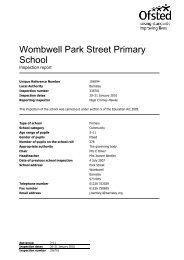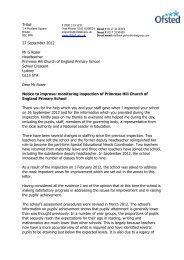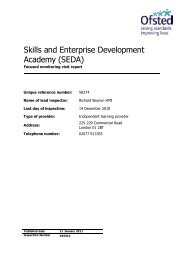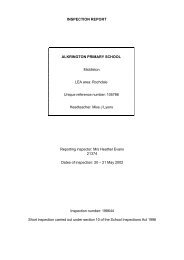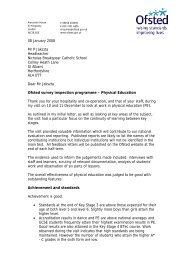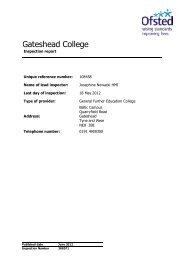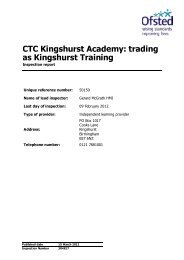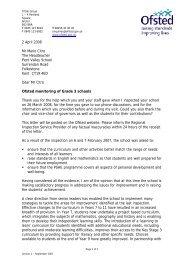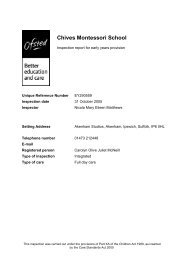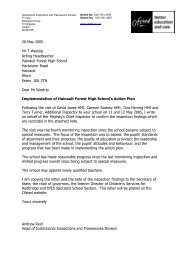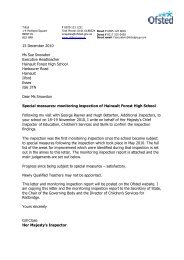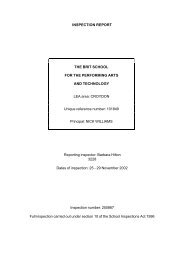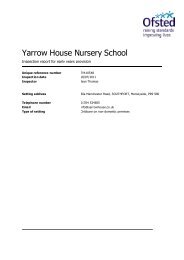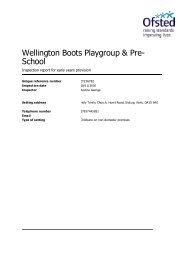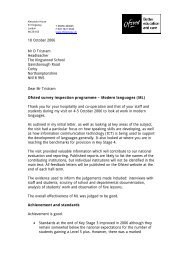pdf School inspection report - Ofsted
pdf School inspection report - Ofsted
pdf School inspection report - Ofsted
You also want an ePaper? Increase the reach of your titles
YUMPU automatically turns print PDFs into web optimized ePapers that Google loves.
provided with good support and make good progress.<br />
132. The co-ordinator is effectively managing the subject and has established very good<br />
knowledge of the strengths and weaknesses of the subject. Resources are managed<br />
well and good for the subject. Maps, globes, atlases and photographs are available<br />
and the school has excellent resources for local and comparative studies. There is a<br />
good policy and scheme of work in place to guide teachers’ planning and to ensure<br />
continuity and progression in pupils’ learning.<br />
HISTORY<br />
133. Whilst it was only possible to observe a limited number of lessons during the period of<br />
the <strong>inspection</strong>, observation of pupils’ work around the school and teachers’ planning<br />
indicate that the majority of pupils make satisfactory progress in the subject. Many<br />
pupils achieve standards broadly in line with those expected for their age at both key<br />
stages.<br />
134. Pupils in Year 1 demonstrate a simple understanding of change over time as they<br />
handle a range of household artefacts linked to washdays long ago, come to an<br />
effective understanding of their use, and compare them to contemporary washday<br />
equipment. The good range of artefacts and an appropriate worksheet did much to<br />
enhance learning in this lesson.<br />
135. Pupils in Year 2 show a satisfactory understanding of chronology as they sequence<br />
pictures in the life of Florence Nightingale, and come to some understanding of health<br />
and medicine during the Victorian period. Pupils then use this knowledge in a useful<br />
manner as they compare the lives of nurses and patients in the past with those of<br />
today.<br />
136. Pupils In Year 5 are provided with the opportunity to develop a clearer understanding<br />
of life in Tudor times as they explore the importance of food in peoples’ lives, and how<br />
the different foods people eat reflect their status in society. After watching an<br />
informative television programme on video, pupils respond to a useful multiple choice<br />
question worksheet to assess their understanding. They are provided with the<br />
opportunity to taste a range of foods appropriate to the period made by the teacher<br />
using original Tudor recipes. Pupils then go on to classify the foods as to whether<br />
they would be eaten by a poor or rich person. This lively and active lesson was much<br />
enjoyed by all pupils. The teacher had obviously spent a great deal of time in<br />
planning and preparing for this lesson. As with all history lessons observed it was<br />
very much enhanced by the good support provided by classroom and bilingual<br />
assistants.<br />
137. Pupils’ learning is much influenced by the good questioning skills used by teachers to<br />
extend pupils’ oral skills and to assess their understanding. Because of the limited<br />
communication skills of a significant number of pupils’ questions tend to be short and<br />
pointed, requiring a specific answer, rather than open-ended questions, which provide<br />
opportunities for an extended response. These same limited communication skills<br />
also inhibit pupils’ ability to develop and utilise a range of research and reference<br />
skills, those factors so often linked with the study of history.<br />
Greenhill Community <strong>School</strong> - 43



